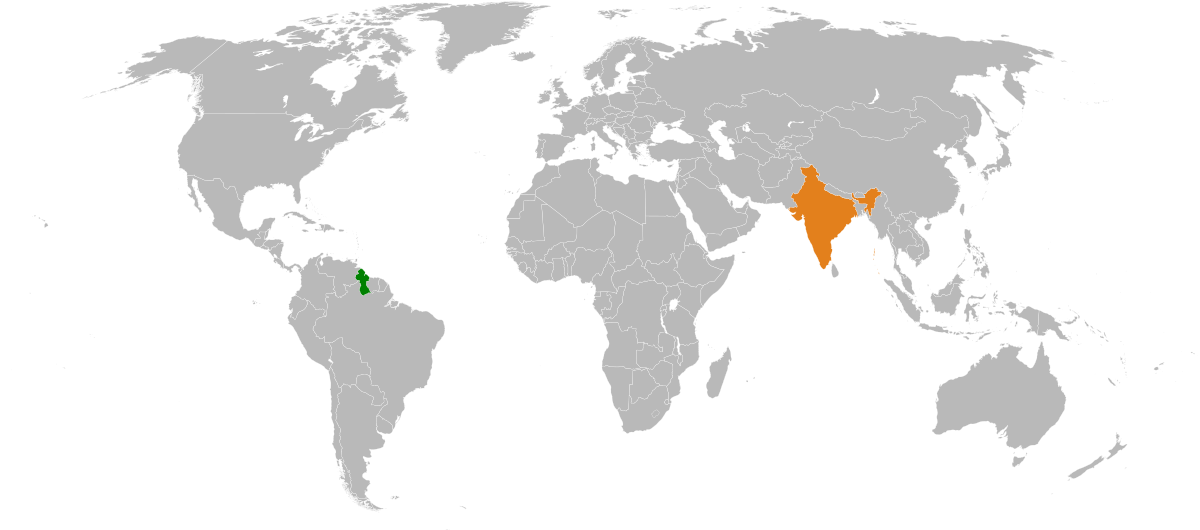Description

Disclaimer: Copyright infringement not intended.
Context: The President of India, Smt. Droupadi Murmu met His Excellency Dr. Mohamed Irfaan Ali, the President of the Cooperative Republic of Guyana at Indore, Madhya on the sidelines of 17th Pravasi Bharatiya Divas Convention.
Details:
- Welcoming President Ali, the President said that we are delighted to have him as the Chief Guest for the 17th Pravasi Bharatiya Divas Convention.
- Pointing out the recent major discoveries of oil and gas in Guyana, she said that there is immense scope of cooperation and collaboration between Guyana and India in this area.
- The President appreciated the Government of Guyana for its continued support to India’s candidature in various international bodies and to India’s priorities on global issues.
Background:
About Guyana’s History:
- During the colonial period, Guyana's economy was focused on plantation agriculture, which initially depended on slave labour.
- Guyana saw major slave rebellions in 1763 and again in 1823.
- Great Britain passed the Slavery Abolition Act in British Parliament that abolished slavery in most British colonies, freeing more than 800,000 enslaved Africans in the Caribbean and South Africa.
- British Guiana became a Crown colony in 1928, and in 1953 it was granted home rule.
- In 1950, Mr. Cheddi Jagan, who was Indian-Guyanese, and Mr. Forbes Burnham, who was Afro-Guyanese, created the colony's first political party, the Progressive People's Party (PPP)
- In 1961, Britain granted the colony autonomy, and Mr. Cheddi Jagan became Prime Minister (1961–1964). In 1964, Burnham succeeded Jagan as Prime Minister, a position he retained after the country gained full independence on May 26, 1966.
- Guyana is the only South American nation in which English is the official language. The majority of the population, however, speak Guyanese Creole, an English-based creole language, as a first language.
- CARICOM’s headquarters is in Georgetown.
- In 2008, Guyana joined the Union of South American Nations as a founding member.
.jpeg)
Indian Community:
- There is a small Indian community of Indians aproximately 300 working as doctors, nurses, lab technicians, small business, skilled workers and laborers in big companies in Guyana.
- The number of Indians is likely to increase with the participation of Indian companies in the field of Agriculture and other business ventures.
India’s contribution:
- India executed some high-visibility projects under Line of Credit in Guyana, i.e. cricket stadium, traffic lights in Georgetown and supply of 14 irrigation drainage pumps.
- India has also set up a Centre of Excellence in Information Technology (CEIT) in Guyana in April 2019 under its Grant assistance programme.
- An LoC of US$50 million was extended in March 2016 for construction of East Bank-East Coast Road linkage project and is under execution.
- India Technical and Economic Cooperation (ITEC) Programme: India has offered 50 slots during 2021-22 for Guyanese scholars to be trained in India under the ITEC (Indian Technical and Economic Cooperation programme). So far, more than 600 Guyanese nationals have benefitted from ITEC Programme.
Culture : Swami Vivekanand Cultural Centre (formerly known as the Indian Cultural Centre) in Georgetown, the arm of ICCR in Guyana, was established in 1972.

https://pib.gov.in/PressReleasePage.aspx?PRID=1890086












